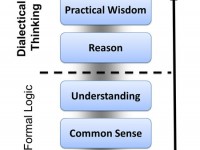5' Introductory video: Otto Laske on the transformative power of learning dialectical thinking Read More...
Tag: Dialectical Thinking
Obituary for Roy Bhaskar
This article is a reflection on the loss the dialectical tradition has incurred through Bhaskar’s early death. In particular, I spell out how his work contributed to CDF, and mention his utter humility as a person. Roy Bhaskar’s Premature Death: A Profound Loss for the Tradition of Dialectical Thinking Read More...
Reflection on the Western rather than Asian character of DTF and the need for research to make it more Asian or acceptable in Asia
By Otto Laske - At the end of the present introductory course on dialectic I wrote to my students the following note: I should mention one great omission from the introductory class which will make the use of the Dialectical Thinking Framework (DTF) more complex but also more deep. We never discussed the issue of “contrasts”, or better of “alternative” thought forms. By this I mean that when scoring we use contrasts to narrow the choice of the thought form to be scored, by thinking of what alternative scorings could be. These could fall into the same class, in which case the overall scoring result would not change (since we are scoring moments of dialectic, not individual thought forms), but they could also fall into a different moment/class, and this could shift the resulting profile. Investigating the Thought Form table further, we realize how “Western” the presentation of thought forms is: we speak of “classes” of thought forms which is something Asians would not find easy since they are used to grouping things based on similarity relationships rather than categories or classes, and thus following logical rules about attribution to a class. Being critical of the table of thought forms... Read More...
Cognitive Development Toward Dialectic
The essence of the cognitive dimension of CDF has to do with how adults differ in making cognitive sense (rather than meaning) of their life and work experiences, thus with what they do and do not understand about the real world. These differences go far beyond “what is in the head” since how people construct the world conceptually precedes their actions in the world, and thus equally manifests in their activities, planning, goal setting, decision making, and execution of leadership functions. In most general terms, students learn to switch from “what” to think to “how” to think, thereby gaining fluidity of thinking based on an awareness of their present way of thinking that makes some things “unthinkable” to them. In this life-changing course, students gain insight not only into the theory of cognitive development and the development of dialectic, but also begin to apply dialectical thought forms in text analysis, in cohort discussion, and in coaching interventions with individuals and teams. Read more Read More...
Case Study I (b): Practicum in Dialectical Thinking and Listening
This course leads participants from merely talking about dialectical thought forms to interactively eliciting them through a semi-structured interview and evaluating their use based on relevant fragments from a client interview. The program offers students the opportunity to show themselves and others that they have not only mastered “developmental theory”, but also know how to use it in practice. For the student, writing a the case study involves: Completing a 1-hr semi-structured cognitive interview following the protocol of the “Three Houses” (possibly in a modified form) Transcribing the interview(s) into English for discussion in the study cohort Selecting 30 structurally relevant fragments of the interview conducted Based on these fragments, presenting in class a coding sheet describing how the client’s cognitive profile is to be evaluated, for discussion in the study cohort At the end of the course, gathering and submitting all pertinent materials making up the case study to the Director of Education for personal feedback on scoring and focusing of client feedback. Read more Read More...
Case Study I (c): Practicum in Dialectical Team Interventions
In this course, students work with members of a team of their choice in order to better manage complexity with the aid of holistic and systemic, “dialectical”, thinking. Focusing on a central team task, they model for team members how to deepen collaboration and partnership in the team by closely listening to others’ task and interpersonal issues. In paying close attention to team discourse, they learn how to facilitate the untrammelled flow of ideas and proposals for solving both well-defined and heretofore ill-defined team problems. Helped by discussions in the study cohort, participants develop pertinent dialectical thinking exercises for their team, both to promote members’ interpersonal functioning and to reflectively deepen their approach to team tasks. They also help team members pay attention to the relationship of their own team to other teams with which they collaborate or compete in the organization. Students obtain a course certificate by submitting to the instructor a written free-form report (about 10 pp.) on how, under their guidance, the team has developed a greater aptitude for defining and pursuing topics and goals crucial for the team’s success. In the report, they spell out details of the results of their interventions during the duration of... Read More...
